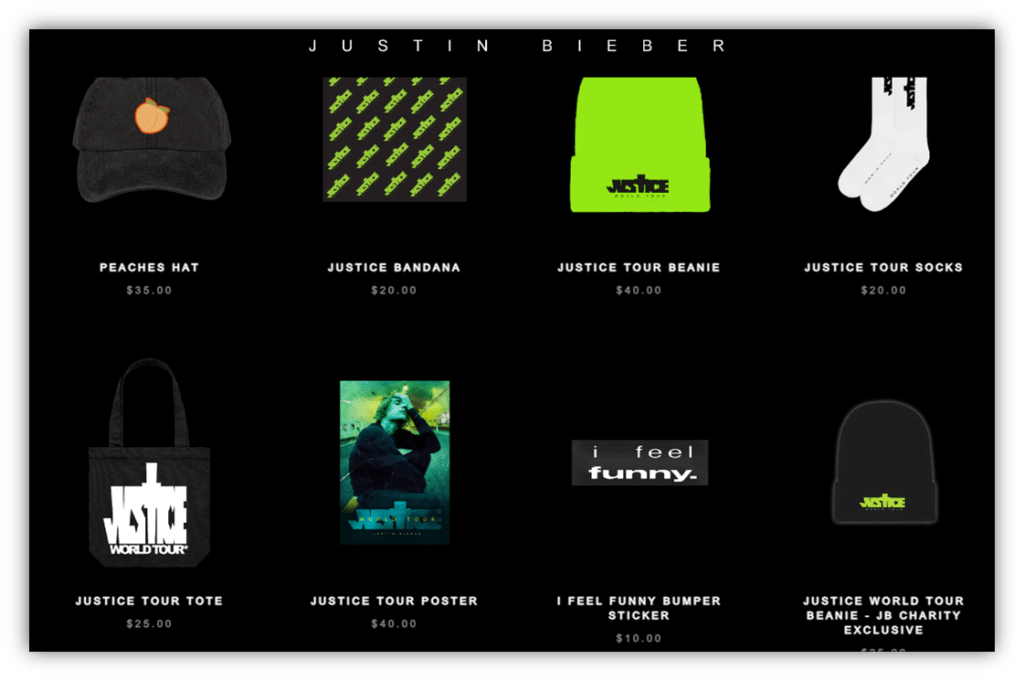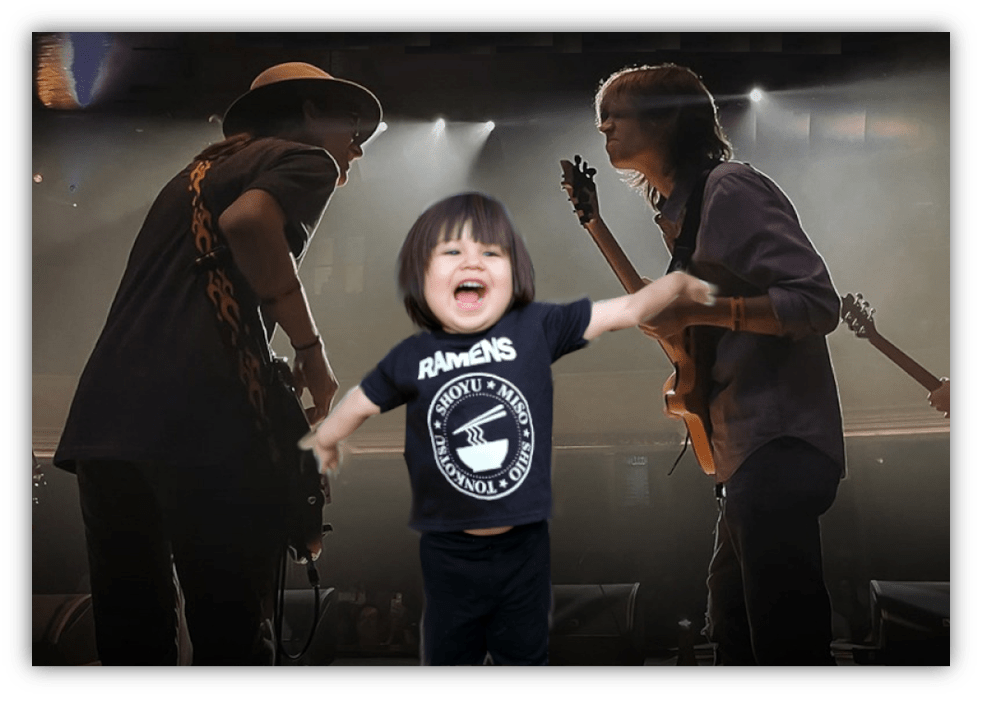Commenting on a recent article by tnocs.com Contributing Author JJ Live At Leeds, I asked if Joy Division’s “Unknown Pleasures” sold more t-shirts than albums:

I’ve seen the design more often than I hear the music, so it struck me as a reasonable question.
I started wondering if it were true for any other artists.
We know for sure that The Ramones sold more shirts than records.

Their friend, artistic director, and “fifth Ramone,” Arturo Vega, designed their logo based on the Great Seal of the President of the United States, but replaced certain aspects with Ramones-related details.
The motto “E Pluribus Unum” first became “Look Out Below!” It later became “Hey Ho, Let’s Go,” a lyric from their song “Blitzkrieg Bop.” The arrows in the eagle’s talons became a baseball bat due to Johnny Ramones’ love of the sport (and maybe their lyric “Beat on the brat with a baseball bat”).

The olive branch became an apple tree branch because Vega, who was from Mexico, thought The Ramones, with their leather jackets, ripped jeans, and aggressive garage rock sound, were “as American as apple pie.”
People like symbols of strength. And a little punk band hijacking the presidential seal is just the kind of subversive imagery that draws attention and sells shirts.

Whether Vega knew that or not, Ramones shirts continue to sell thirty years after they recorded their last album. I’d even bet that more people own the shirt without owning the music, than the other way around.
Though music is meant for the ears, it’s important for musicians to have a strong visual identity.
Musicians want to be known for their music, obviously, but good graphic design makes the music more saleable.
Everything from the band’s name to the logo to the album cover should be distinct, interesting, and adaptable to different media.

Graphics need to work on t-shirts, bumper stickers, and beer koozies. The right logo can raise a band above the rest, at least in terms of recognizability.
When you see the red lips and tongue, you think of “The Rolling Stones” immediately.

It doesn’t even have the band’s name, but you recognize it.
Many groups have their names in their logos, but you can identify them based on the font alone.

Selling more merch than music is becoming more common in the internet age.
The decline of physical record sales in favor of streaming (and its low profits) means musicians have to look elsewhere for money. Artists might seek out licensing deals, endorsements, and sponsorships.
But sales of t-shirts, hoodies, hats, and other items, is a big percentage of their income. It also gives them control over their brand and image.
This is especially true for artists with dedicated fan bases and extensive touring.

Concert-goers buy merch as souvenirs or mementos of the event. Some fans even buy merch specifically to support their favorite artists and keep them in business.
Band apparel has become a fashion statement and a way for fans to express their identity and allegiance to their favorite artists or genres. Clothing with visually interesting logos or album artwork can appeal to an audience beyond the band’s dedicated fans. This is the case with The Ramones and, I think, Joy Division.
This isn’t an exhaustive list, but here are a few examples of artists known for their successful merchandise sales.
- The Grateful Dead are famous for their Deadheads, the dedicated fans who travel great distances to see the band and buy a lot of merch.
The band’s unique artwork, including its dancing bear and lightning bolt skull, has been featured on a wide range of merchandise items, from t-shirts and hats to aprons and posters and bobbleheads.

You might even see a Deadhead sticker on a Cadillac.
- KISS built a massive brand empire around its distinctive imagery.
They’ve long been known for their relentless merchandising. There are KISS t-shirts, posters, key rings, action figures, and the KISS Kasket.

They even put out a comic book printed with their own blood.
- Metallica didn’t go that far, but they have a substantial merchandise business.
The band’s logo and imagery are iconic in and out of the metal community.

Unsurprisingly, Beavis wore a Metallica shirt.
- Justin Bieber has built a lucrative merchandise empire with his line of clothing, accessories, and other branded items.

Bieber is a good example of a musician whose merch sales have been particularly successful on tour and at promotional events.
As a Dirty Santa gift at the office holiday party, I received a Justin Bieber singing electric toothbrush. I regifted it the next year.
- The South Korean boy band BTS has achieved global success in both music and merch.
BTS merchandise, including t-shirts, hoodies, and accessories, is immensely popular among the BTS Army, which is what the band’s dedicated fans call themselves.

My favorite BTS item: the clothes hangers. Imagine your friends going to hang up their coats and being frightened by a group of young men in your closet.
Besides t-shirts, Weezer sells fake mustaches, Mötley Crüe has Dr. Feelgood stethoscopes, and Metallica has their own version of the Monopoly board game.
Ozzy Osbourne has a plush toy bat with a detachable head and grilling utensils for heavy metal backyard cookouts.

You can also get a ChiaPet in the shape of Weird Al Yankovic’s head. Its plants grow out in the shape of his hair.
Now, back to the original question:
Has Joy Division sold more t-shirts than records?
It’s impossible to say, and for an interesting reason:
Joy Division didn’t sell shirts.

The Unknown Pleasures cover shows radio waves from pulsar CP 1919.
Artist Peter Saville copied it from The Cambridge Encyclopaedia of Astronomy and inverted the colors so it would be on a black background. The band doesn’t own the image. It’s publicly available and anyone can put it on a shirt.
Joy Division never bothered to do so. They were more interested in making music than merch.

Peter Hook, the band’s bassist, said, “Ironically, Joy Division didn’t believe in merch, we thought any self-promotion with singles on LPs or any picture of yourself was the work of the devil.”
There are no official statistics of how many Joy Division shirts have been sold because any store or website or ambitious kid can print some up. And Joy Division sees none of the money.
Their records sold well and they continue to be influential in alternative music circles.
But the merchandise, particularly t-shirts featuring the Unknown Pleasures graphic, seem to be more popular than the music.

This is speculation on my part, but it’s possible that, since the band’s name didn’t appear on the album cover, some people might buy the shirt without knowing what it represents.
It’s just a cool image.
By the way:
I still have some Pussycat Doghouse shirts for anyone interested.

Let the author know that you liked their article with a “Green Thumb” Upvote!





Excellent stuff and I did not realise that Joy Division don’t earn anything from the Unknown Pleasures tshirt sales. Then again, while they were on Factory the label would only have found some madcap scheme to spend the profits on.
I’m assuming it’s the same in the US that Ramones and Rolling Stones tshirts in particular have become fashion items disassociated from the bands. They’re available in many high street clothing retailers and aimed at teenagers ans 20 somethings who are unlikely to be fans of the band. In the case of The Ramones have probably not even heard them.
I’m sure the Rolling Stones are on top of the licensing for their tongue and lips logo but I’ve always wondered who is making the money on The Ramones tshirts.
Over here around the turn of the 90s ‘t-shirt bands’ was a slightly derogative phrase used by the weekly music press for the likes of James, Senseless Things, Neds Atomic Dustbin and more, who appeared to sell more of their distinctive tshirts than they did records (though James in particular would go onto break out from that).
Metalcore is the one genre where I feel like T-shirts are way more popular than records. A7X is in the article, and their skull & wings logo is way more recognizable than “Bat Country,” but I feel Sleeping with Sirens and Pierce the Veil are the ultimate examples. I cannot name a song by either of them, but their T-shirts are ubiquitous.
CP 1919 pulses as I scroll the screen up and down.
Freakin’ me out man, it’s freakin’ me out!
That is hilarious! I’ve been doing the same thing every time I scroll this article!
I was never really big on band t-shirts, because at a concert I already spent too much money to see, the merch was so expensive, and the quality of the shirts was cheaper than cheap.
That being said, one of my kids heard my request, and put one of my favorite album covers of all time on a T-shirt for me for Christmas.
That’s a cool shirt, and a good kid.
That kid really loves his pop! pop!
I feel like Bob Marley has to be a contender for selling more t-shirts than records. Yes, he sold a lot of records, but his merch is everywhere. I saw a lot of Marley t-shirts at the high school where I taught. My standard question was, “Do you know any of his music? Or do you just know that he smoked a lot of dope?” 10% knew some of the music. 70% knew he smoked a bunch of dope. 20% didn’t know he was a real person, they just liked the picture and colors.
Fascinating. I bet you’re right. He’s been dead for, searching Google, over 40 years, so there’s no more music coming. I’m sure the greatest hits album is still selling somewhat but the merch, authorized or otherwise, most certainly has outsold the music by this point.
I actually have no memory of ever seeing a Bob Marley t-shirt in my life.
Though I feel like that might be an element of racism in the places I’ve lived – the black artists to be notable T-shirt sellers in my experience are either 90s rappers (Wu-Tang, Snoop), artists who died relatively young and relatively recently (MJ, Aaliyah), or both (Tupac, Biggie).
This made me think of something I recently saw: the Alphabet of Rock. Do you know the bands represented here based on the letter font? If so, you know your logo abcs.
(I can only get 19)
That’s cool! I get 16 for sure, possibly 20 without looking them up.
I got 12 for sure. A few others I may have gotten right.
Same!
I know ABDGKMPQRXYZ for sure, and I have guesses on SV.
I am flummoxed by C, E, G, I, N, T, and U.
I think G is Guns ‘n’ Roses. N is Nazareth, and I thought the U was Ultravox but I can’t find it anywhere.
Ah, GnR!
I did some Googling, and I’m pretty sure the I is Iron Maiden.
Hoping that the Ramens make it to the DC region some time…
I love that kid!